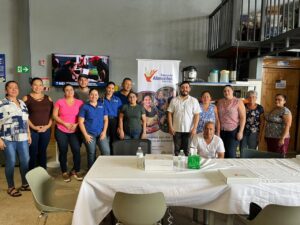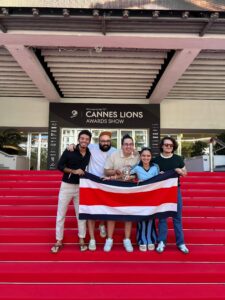- The documentary is the result of a joint effort between Imperial and its strategic allies: MINAE-SINAC, AERIS and the University of Costa Rica.
- Together they developed a technological, sustainable and scientifically rigorous solution to restore marine ecosystems affected by the massive extraction of shells.
On the coasts of Costa Rica, a silent problem threatens the natural wealth that defines the country as an ecological paradise. The massive extraction of seashells, encouraged by local and international tourism, has generated a devastating impact on marine ecosystems. Often ignored, this practice threatens the delicate balance of the beaches, habitat for species essential to biodiversity and the basis for sustainable tourism.
The indiscriminate extraction of shells generates profound environmental consequences. According to Dr. Yolanda Camacho, biologist at the University of Costa Rica, this problem affects beaches in multiple ways, including accelerated erosion, as the presence of shells is reduced and beaches lose structural stability, making them more vulnerable to extreme weather events and rising sea levels. In addition, marine habitats are altered: shells play a key role in the formation of calcareous structures, which are essential for organisms such as corals.
Camacho added that indiscriminate shell extraction produces loss of refuges for key species such as hermit crabs, essential for the local food chain, which depend on shells for shelter. In areas such as Puntarenas, their decline is evident. Finally, there is a chemical imbalance in the ocean, as the shells prevent the acidification of seawater. Acidity alters the availability of essential nutrients such as iron and nitrogen, interfering with the reproduction of species and the ability of marine organisms to form calcium carbonate skeletons and shells.
In 2023, more than 5 tons of shells were seized at the Juan Santamaría and Daniel Oduber airports. They end up buried due to the difficulty in determining the origin of these shells (Pacific or Caribbean).
Classifying shells is a monumental task. It requires the specialized knowledge of biologists, whose training can take more than 15 years, and absolute dedication: analyzing 350 kilos of shells could take 6 months of full-time work. Against this backdrop, thousands of shells remain in storage or, in the worst case, buried, while marine ecosystems suffer the consequences of their loss.
The answer: science, innovation and collaboration
Faced with this problem, FIFCO and its Imperial brand, in alliance with the Ministry of Environment and Energy through the National System of Conservation Areas (MINAE-SINAC), AERIS, manager of the Juan Santamaria International Airport, and the University of Costa Rica (UCR), present a solution based on technology and inter-institutional cooperation, embodied in the documentary “De Vuelta a Casa” (Back Home), a project that not only makes this ecological crisis visible, but also offers a real solution.
At the heart of this initiative is a revolutionary innovation: an artificial intelligence application, developed by FIFCO, capable of identifying in seconds whether a shell belongs to the Pacific or the Caribbean, with an accuracy of over 90%. For its development, a unique database of 18,500 shell images collected with the help of more than 200 volunteers was created. This model, which learned through thousands of iterations, made it possible to classify 36,000 shells in record time, achieving a breakthrough that was previously unthinkable.
The impact of the project is already tangible. For the first time, the seized shells did not end up buried. In a single day, all shells seized over the course of a year were returned to the sea, restoring their role in the marine ecosystems of the Pacific and Caribbean. This achievement not only emptied the containers at the airports but marked the beginning of a profound change in the way this environmental problem is addressed.
Franz Tattenbach, Minister of Environment and Energy, commented that, “The Ministry of Environment and Energy, through the National System of Conservation Areas and its other agencies, promotes collaborative work efforts with public and private institutions and civil society in search of the preservation and restoration of the ecological balance and protection of the environment.
It is for this reason that we support initiatives such as the documentary “De Vuelta a Casa”, which seeks to raise awareness in every Costa Rican and person who visits our country about their role in the protection of marine ecosystems. At the same time, this initiative provides law enforcement officials with technological mechanisms and technical-scientific support to assist in the identification and management of seized shells in the country.
Finally, we call for wildlife to be enjoyed in their natural habitats and not to extract shells from our coasts. Each species plays a fundamental role in the ecosystem of which it is a part and contributes to the maintenance of ecological processes that ensure the quality of life and well-being of present and future generations”.
Beyond restoration: a commitment to prevention
Although returning shells to the sea is an avant-garde milestone, the real change lies in preventing their removal from ecosystems. The documentary “De Vuelta a Casa” seeks to educate the public and transform the perception of seashells: they are not tourist souvenirs, but key pieces of the ecological gear that sustains marine life and the well-being of coastal communities.
“At FIFCO we firmly believe that sustainability is a shared responsibility. “De Vuelta a Casa” reflects our commitment to expansive sustainability, to lead with purpose, bringing together science, technology and collaboration to give back to nature what belongs to it. This project is a call to act together, to protect what makes us unique as a country and to ensure that future generations can enjoy a sustainable and healthy marine ecosystem,” said Maria Pia Robles, FIFCO’s Director of Corporate Relations.
A transforming alliance
For Imperial, this initiative reinforces its commitment to sustainability and environmental leadership. The collaboration with MINAE-SINAC, AERIS and UCR demonstrates the power of public-private partnerships in creating innovative and effective solutions.
“At AERIS, manager of Juan Santamaría Airport, we assume the responsibility of turning the airport into a space that not only connects destinations, but also drives concrete actions for sustainability. As the first contact of many visitors with Costa Rica, we collaborate with initiatives that protect our biodiversity. De Vuelta a Casa is an inspiring example of how we make a real difference through strategic alliances, innovation and a firm commitment to marine conservation,” highlighted Adriana Bejarano, head of Environment, Health and Safety at AERIS.
A call to action
“De Vuelta a Casa” is not just a documentary; it is an invitation to be part of the change. Imperial urges all Costa Ricans, tourists and companies to become ambassadors of marine biodiversity, to make responsible decisions and to unite in protecting the beaches that are the pride of Costa Rica.
Because every shell counts and every action, no matter how small it may seem, makes a difference in the conservation of the planet.
For more information about “De Vuelta a Casa”, its achievements and how to join the cause, visit the following link: https://imperial.cr/devueltaacasa/


